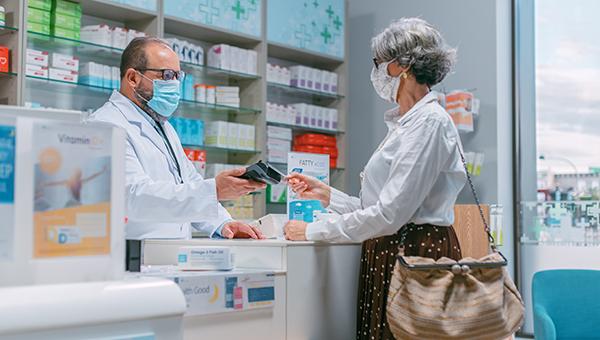No Benefit for Icosapent Ethyl, P2Y12 Inhibitors in Separate COVID-19 Trials
“To know that something does not work . . . is just as helpful as knowing that it does work,” Amit Khera says.

The medical and research communities continue to refine what works and what doesn’t in COVID-19, and joining the latter group are two new trials targeting the inflammatory and thrombotic risks of the disease: one using icosapent ethyl (Vascepa; Amarin) in outpatients and the other testing P2Y12 inhibitors in patients who are hospitalized but not critically ill.
In the placebo-controlled PREPARE-IT 2 trial, icosapent ethyl, a prescription-grade omega-3 fatty acid formulation, failed to significantly reduce the rate of COVID-19-related hospitalization or death through 28 days, Rafael Díaz, MD (Estudios Clínicos Latinoamérica, Rosario, Argentina), reported.
And in the ACTIV-4a trial, adding P2Y12 inhibitors to usual care—which involved full-dose anticoagulation in the vast majority of patients—did not provide an added benefit compared with usual care alone in terms of days alive without organ support or other outcomes, according to Jeffrey Berger, MD (NYU Langone Health, New York, NY).
The results of both trials were presented Monday during late-breaking science sessions at the virtual American Heart Association (AHA) 2021 Scientific Sessions.
Commenting for TCTMD, Amit Khera, MD (UT Southwestern Medical Center, Dallas, TX), vice chair of the meeting’s program committee, said the findings of the trials, despite being neutral, are helpful as clinicians navigate patient care during the pandemic, adding that the speed with which these trials were completed is a testament to science and all of the investigators.
Early on during the pandemic when there was so much uncertainty about how to treat patients, physicians were trying a variety of approaches—including anti-inflammatory and antithrombotic therapies—based on anecdotal reports and beliefs about what might work.
“What happens when we have things that we think work and we’re not sure is we end up treating a lot of patients needlessly, and there can be harms as well,” Khera said, pointing to increased bleeding with antiplatelets as an example. “To know that something does not work, in my opinion, is just as helpful as knowing that it does work, because then we move on.”
PREPARE-IT 2
Icosapent ethyl was shown to lower MACE in high-risk patients in the REDUCE-IT trial, but the magnitude of the effect could not be fully explained by the accompanying reduction in triglycerides. The agent also has some anti-inflammatory and antithrombotic properties, which is why researchers have thought it might be helpful in the setting of COVID-19 and the inflammation and thrombosis that comes along with it.
A 100-patient trial reported late last year, called VASCEPA COVID-19 CardioLink-9, showed that icosapent ethyl reduced high-sensitivity C-reactive protein levels and improved symptoms in symptomatic outpatients with COVID-19. Then, earlier this year, results of the PREPARE-IT 1 trial, with 1,712 patients enrolled, showed that the agent did not prevent SARS-CoV-2 infection in healthy participants, but that it did show that a high loading dose (8 grams per day) was well tolerated.
That laid the groundwork for PREPARE-IT 2, which enrolled 2,052 patients 40 or older (mean age 52 years; 53% women) who were no more than 7 days out from the onset of COVID-19 symptoms and did not have a clear indication for hospitalization. Patients were randomized to icosapent ethyl—8 grams/day for the first 3 days followed by 4 grams/day through day 28—or placebo. The trial was conducted entirely over the Internet.
The primary outcome was a composite of COVID-19-related hospitalization (either an indication for admission or an actual hospitalization) or death through 28 days. Though the rate was numerically lower in the icosapent ethyl group, the difference was not significant (11.16% vs 13.69%; HR 0.84; 95% CI 0.65-1.08). Similar patterns were seen for a number of secondary outcomes.
Active treatment, including the high loading dose, was well tolerated, with no difference in overall safety events between the icosapent ethyl and placebo groups (16.58% vs 14.85%; P = 0.30). Permanent discontinuation was significantly higher with icosapent ethyl (7% vs 4%; P = 0.001).
Alluding to the nonsignificantly lower event rates in the active treatment arm of the trial, Díaz said during a media briefing that “larger, randomized clinical trials powered for the detection of moderate benefits . . . are needed to establish if icosapent ethyl might have a role in the management of COVID-19 outpatients.”
Asked whether a larger trial would be worth it at this stage of the pandemic, as vaccines continue to roll out and effective antiviral medications may soon be available, Díaz said there isn’t an easy answer. “Maybe it’s not worth [it] at this time of the pandemic,” he said. “Maybe the vaccination rate will lower the rate of infections and outpatients with COVID, . . . but I am not sure.”
For Khera, it was “maybe not surprising that it wasn’t effective in this trial, but as they point out, it did at least trend in the right direction, so it still keeps the hypothesis open.” He expressed skepticism about another trial, though, noting that one powered for more-modest benefits would have to include 8,000 to 10,000 patients. Moreover, “this may not be the best way to attack inflammation,” he said. “High-dose omega-3, while it potentially has some anti-inflammatory properties, I don’t know that people think of it as as strong of an anti-inflammatory medication as many others that people are looking at.”
ACTIV-4a
The ACTIV-4a investigators have focused on studying the best ways to address the thrombotic risks associated with COVID-19, previously showing that full-dose versus prophylactic-dose heparin has a clinical benefit in hospitalized patients who are moderately ill, but not in those who require ICU-level care.
The trial also included a look at the impact of P2Y12 inhibitors in both types of populations, with Berger reporting the results in the noncritically ill cohort. Platelets contribute to the severity of COVID-19, with the infection leading to increased platelet production and size, platelet immaturity, and platelet hyperreactivity, all contributing to thrombotic events, organ failure, and death, he said.
When the P2Y12 inhibitor portion of the trial was stopped for futility, 562 patients (mean age about 52 years; roughly 41% women) had been randomized to P2Y12 inhibitors on top of standard of care or standard of care alone, which included full-dose anticoagulation in nearly 90% of patients. Most patients in the P2Y12 inhibitor group (63%) received ticagrelor, with the rest receiving clopidogrel. The median duration of treatment was 6 days.
The primary endpoint was the number of days alive without organ support through 21 days, and there was no difference between trial arms (adjusted OR 0.83; 95% CI 0.55-1.25). In fact, the cumulative rate of death or organ support was numerically higher in patients who received P2Y12 inhibitors (26% vs 22%; adjusted HR 1.19; 95% CI 0.84-1.68).
Rates of in-hospital death (4.4% in the P2Y12 inhibitor arm vs 3.0% in the standard-of-care arm), major thrombotic events (2.4% vs 1.9%), and major bleeding (2.0% vs 0.7%) were low overall and not significantly different between groups.
“Testing of P2Y12 inhibitors in critically ill patients is still ongoing,” Berger said, noting that the trial will start enrolling patients to assess the impact of P-selectin inhibitors and sodium-glucose cotransporter 2 inhibitors shortly.
Discussing the results after Berger’s presentation, Erin Bohula, MD, DPhil (Brigham and Women’s Hospital, Boston, MA), praised the trial for its rapid recruitment, the high adherence to study therapy, and the quality of the background medical therapy.
But she also raised some issues to consider when interpreting the results, pointing to the low-risk population; the use of full-dose anticoagulation by most participants; the limited duration of the intervention relative to the observation time, “which of course will bias you towards the null or towards a neutral result”; and uncertainty about whether the endpoint chosen would be modifiable by P2Y12 inhibition.
“Keep in mind [the trial] was not powered to detect differences in key secondary efficacy or safety endpoints, but the rates of these events generally speaking were quite low, and so I think the data that you’ve seen does not support the use of these agents in this context,” Bohula said. “But it definitely will be important to address this similar question in a higher-risk population.”
Indeed, Khera said, the specific population included in studies appears to be important when determining whether certain treatments are effective for combating COVID-19.
“Neither of these therapies seems to be beneficial, but I do think it’s helpful to know that in terms of helping us move forward with what we should be using and what therapies we should focus on,” he concluded.
Todd Neale is the Associate News Editor for TCTMD and a Senior Medical Journalist. He got his start in journalism at …
Read Full BioSources
Díaz R. PREPARE-IT 2: a pragmatic trial evaluating icosapent ethyl in nonhospitalized patients with a positive diagnosis of COVID-19 to reduce hospitalization rates and complications. Presented at: AHA 2021. November 15, 2021.
Berger J. ACTIV-4a: P2Y12 inhibitors in noncritically ill hospitalized patients with COVID-19. Presented at: AHA 2021. November 15, 2021.
Disclosures
- PREPARE-IT 2 was funded by a grant from Amarin.
- Díaz reports grants from Amarin, DalCor, Lepetit SA, and PHRI.
- ACTIV-4a was funded by the National Heart, Lung, and Blood Institute.
- Bohula reports being an investigator in COVID-PACT, a trial of antithrombotic therapy in critically ill patients with COVID-19; receiving institutional research grants from Abbott, Amgen, Anthos Therapeutics, AstraZeneca, Daiichi Sankyo, Eisai, Intarcia, MedImmune, Merck, Novartis, Pfizer, Regeneron Pharmaceuticals, Roche, The Medicines Company, and Zora Biosciences; and having relationships with Medscape, Merck, Servier, Amgen, PriMed, Novo Nordisk, and Kowa.





Comments